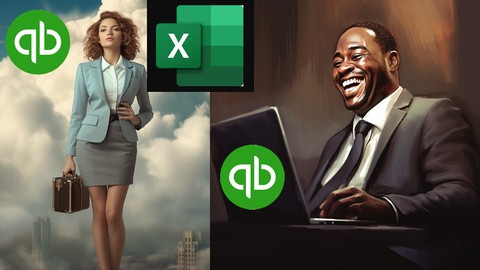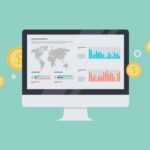
QuickBooks Online vs. QuickBooks Desktop vs. Excel
QuickBooks Online vs. QuickBooks Desktop vs. Excel, available at $74.99, has an average rating of 4.2, with 648 lectures, based on 137 reviews, and has 18299 subscribers.
You will learn about Analyze the core functionalities of QuickBooks Online, QuickBooks Desktop, and Excel for accounting tasks. Evaluate the strengths and weaknesses of each platform in handling accounting transactions. Execute common accounting transactions in QuickBooks Online, QuickBooks Desktop, and Excel. Conduct transactional analysis in the vendor, customer, and employee accounting cycles across all three platforms. Create, manage, and interpret financial statements and related reports in QuickBooks Online, QuickBooks Desktop, and Excel. Perform bank reconciliation procedures in both QuickBooks versions and mimic the process in Excel. Apply adjusting entries at the month or year-end to align financial statement reports to their accounting basis across all three platforms. Examine the management of different accounting bases such as accrual, cash, or tax basis in QuickBooks Online, QuickBooks Desktop, and Excel. Compare and contrast the workflows in QuickBooks Online, QuickBooks Desktop, and Excel and decide on the best platform based on specific requirements. This course is ideal for individuals who are Current QuickBooks and Excel Users: If you're already using any of these tools and want to learn about the other platforms, this course will provide a detailed comparison and insights. or Accounting Professionals: Accountants, bookkeepers, auditors, or anyone in an accounting role will benefit from understanding the differences, strengths, and weaknesses of these platforms to serve their clients better. or Business Owners and Entrepreneurs: If you're considering which software to use for your business, this course will help you understand which platform suits your needs the best. or Accounting and Finance Students: This course will offer practical insights into the most popular accounting software platforms and Excel, providing an edge in the job market. or Freelancers and Self-Employed Individuals: If you manage your own finances and need to decide which tool is best for your business, this course will provide the necessary insights. or Finance Consultants and Advisors: Enhance your advisory services by gaining an in-depth understanding of QuickBooks Online, QuickBooks Desktop, and Excel as accounting tools. or Anyone considering QuickBooks or Excel for their accounting needs: Whether you're new to these tools or exploring new software options, this course provides a detailed comparative study. It is particularly useful for Current QuickBooks and Excel Users: If you're already using any of these tools and want to learn about the other platforms, this course will provide a detailed comparison and insights. or Accounting Professionals: Accountants, bookkeepers, auditors, or anyone in an accounting role will benefit from understanding the differences, strengths, and weaknesses of these platforms to serve their clients better. or Business Owners and Entrepreneurs: If you're considering which software to use for your business, this course will help you understand which platform suits your needs the best. or Accounting and Finance Students: This course will offer practical insights into the most popular accounting software platforms and Excel, providing an edge in the job market. or Freelancers and Self-Employed Individuals: If you manage your own finances and need to decide which tool is best for your business, this course will provide the necessary insights. or Finance Consultants and Advisors: Enhance your advisory services by gaining an in-depth understanding of QuickBooks Online, QuickBooks Desktop, and Excel as accounting tools. or Anyone considering QuickBooks or Excel for their accounting needs: Whether you're new to these tools or exploring new software options, this course provides a detailed comparative study.
Enroll now: QuickBooks Online vs. QuickBooks Desktop vs. Excel
Summary
Title: QuickBooks Online vs. QuickBooks Desktop vs. Excel
Price: $74.99
Average Rating: 4.2
Number of Lectures: 648
Number of Published Lectures: 648
Number of Curriculum Items: 648
Number of Published Curriculum Objects: 648
Original Price: $199.99
Quality Status: approved
Status: Live
What You Will Learn
- Analyze the core functionalities of QuickBooks Online, QuickBooks Desktop, and Excel for accounting tasks.
- Evaluate the strengths and weaknesses of each platform in handling accounting transactions.
- Execute common accounting transactions in QuickBooks Online, QuickBooks Desktop, and Excel.
- Conduct transactional analysis in the vendor, customer, and employee accounting cycles across all three platforms.
- Create, manage, and interpret financial statements and related reports in QuickBooks Online, QuickBooks Desktop, and Excel.
- Perform bank reconciliation procedures in both QuickBooks versions and mimic the process in Excel.
- Apply adjusting entries at the month or year-end to align financial statement reports to their accounting basis across all three platforms.
- Examine the management of different accounting bases such as accrual, cash, or tax basis in QuickBooks Online, QuickBooks Desktop, and Excel.
- Compare and contrast the workflows in QuickBooks Online, QuickBooks Desktop, and Excel and decide on the best platform based on specific requirements.
Who Should Attend
- Current QuickBooks and Excel Users: If you're already using any of these tools and want to learn about the other platforms, this course will provide a detailed comparison and insights.
- Accounting Professionals: Accountants, bookkeepers, auditors, or anyone in an accounting role will benefit from understanding the differences, strengths, and weaknesses of these platforms to serve their clients better.
- Business Owners and Entrepreneurs: If you're considering which software to use for your business, this course will help you understand which platform suits your needs the best.
- Accounting and Finance Students: This course will offer practical insights into the most popular accounting software platforms and Excel, providing an edge in the job market.
- Freelancers and Self-Employed Individuals: If you manage your own finances and need to decide which tool is best for your business, this course will provide the necessary insights.
- Finance Consultants and Advisors: Enhance your advisory services by gaining an in-depth understanding of QuickBooks Online, QuickBooks Desktop, and Excel as accounting tools.
- Anyone considering QuickBooks or Excel for their accounting needs: Whether you're new to these tools or exploring new software options, this course provides a detailed comparative study.
Target Audiences
- Current QuickBooks and Excel Users: If you're already using any of these tools and want to learn about the other platforms, this course will provide a detailed comparison and insights.
- Accounting Professionals: Accountants, bookkeepers, auditors, or anyone in an accounting role will benefit from understanding the differences, strengths, and weaknesses of these platforms to serve their clients better.
- Business Owners and Entrepreneurs: If you're considering which software to use for your business, this course will help you understand which platform suits your needs the best.
- Accounting and Finance Students: This course will offer practical insights into the most popular accounting software platforms and Excel, providing an edge in the job market.
- Freelancers and Self-Employed Individuals: If you manage your own finances and need to decide which tool is best for your business, this course will provide the necessary insights.
- Finance Consultants and Advisors: Enhance your advisory services by gaining an in-depth understanding of QuickBooks Online, QuickBooks Desktop, and Excel as accounting tools.
- Anyone considering QuickBooks or Excel for their accounting needs: Whether you're new to these tools or exploring new software options, this course provides a detailed comparative study.
Welcome to this comprehensive course designed to delve into a comparative study of QuickBooks Online, QuickBooks Desktop, and Microsoft Excel for accounting transactions. This course will provide a complete understanding of the three platforms, allowing you to evaluate their strengths, weaknesses, and best-fit scenarios based on your unique requirements.
Starting with an introduction to each platform, we’ll clarify their distinct functionalities, highlighting what makes each of them unique. We’ll explain the context in which one might be more beneficial over the other, considering factors such as cost, convenience, complexity, and capabilities.
The course will guide you to master the navigation of QuickBooks Online, QuickBooks Desktop, and Excel. You’ll learn to set up and organize data, understanding the interfaces, and identifying the relationships between data input and the resultant financial reports.
We use a transactional analysis approach, categorizing transactions into vendor, customer, and employee accounting cycles. You’ll gain an understanding of each cycle’s data input forms and their impact on financial statements and related reports in all three platforms.
A significant part of this course involves creating and managing a new company file. We will guide you through setting up foundational accounting components such as the chart of accounts, service items, revenue items, and starting balances in each platform.
We’ll demonstrate how to perform common transactions over a span of two months in QuickBooks Online, QuickBooks Desktop, and Excel, helping you understand the differences in workflows and impacts on financial statements and reports.
Bank reconciliation, a critical part of maintaining financial integrity, will also be covered. You’ll understand how to handle bank reconciliations in both QuickBooks versions and emulate the process in Excel.
We delve into the details of adjusting entries in each platform, used to align financial statement reports to their accounting basis at the month or year-end. We’ll explore the management of different accounting bases such as accrual, cash, or tax basis across QuickBooks Online, QuickBooks Desktop, and Excel.
By the end of this course, you will have gained a comprehensive understanding and developed a robust skillset to expertly navigate and utilize QuickBooks Online, QuickBooks Desktop, and Excel for all your accounting needs. You will be able to compare, contrast, and choose the best platform based on the specific requirements of your business or profession.
This course provides a thorough, in-depth exploration of QuickBooks Online, QuickBooks Desktop, and Excel as accounting tools, enabling you to understand their potential to enhance your accounting efficiency and make informed decisions. Whether you’re an accountant, a business owner, a student, or simply interested in learning about different accounting tools, this course is your one-stop solution.
Course Curriculum
Chapter 1: QBO-Getting Started 2023
Lecture 1: 1005 How to Access the Software
Lecture 2: 1011 QuickBooks Online vs QuickBooks Desktop
Lecture 3: 1013 Increase Screen Size, Duplicate Tabs, & Open Multiple Browsers
Lecture 4: 1015 Navigation Overview
Lecture 5: 1017 Bank Feeds & Your Accounting System
Lecture 6: 1080 Accounting Process & Forms Overview
Chapter 2: DT-Getting Started – QuickBooks Desktop 2023
Lecture 1: 1009 QuickBooks Desktop Options
Lecture 2: Documents to Download
Lecture 3: 1010 How To Download the Software
Lecture 4: 1012 30 Day Free Trial or Purchase Process
Lecture 5: 1015 Install QuickBooks Desktop
Lecture 6: 1017 Increase Display Size
Chapter 3: Excel – Setup Worksheet
Lecture 1: 1025 Create Accounting Worksheet Part 1
Lecture 2: 1028 Create Accounting Worksheet Part 2
Lecture 3: 1031 Create Accounting Worksheet Part 3
Lecture 4: 1034 Create Accounting Worksheet Part 4
Lecture 5: 1037 Create Accounting Worksheet Part 5
Lecture 6: 1040 Create Accounting Worksheet Part 6
Lecture 7: 1043 Create Accounting Worksheet Part 7
Lecture 8: 1046 Create Accounting Worksheet Part 8
Lecture 9: 1049 Create Accounting Worksheet Part 9
Lecture 10: 1052 Create Accounting Worksheet Part 10
Lecture 11: 1055 Create Accounting Worksheet Part 11
Chapter 4: QBO-Vendor, Accounts Payable, Expenses, or Purchases Cycle
Lecture 1: 1140 Vendor, Expense, Purchases, Pay, or AP Cycle
Lecture 2: 1160 Vendor Expense, Purchases, or Pay Center
Lecture 3: 1180 Bills Form
Lecture 4: 1200 Pay Bills Form
Lecture 5: 1220 Purchase Order Form – P.O.
Lecture 6: 1240 Manage Sales Tax Form
Lecture 7: 1260 Check & Expense Form
Lecture 8: 1280 Void Check Prior Period Adjustment
Chapter 5: DT-Open Practice File-Review Home Page & Accounting Cycles 2023
Lecture 1: 1020 Download & Open Sample File
Lecture 2: 1080 Home Page Overview
Lecture 3: 1100 Bank Feeds
Lecture 4: 1120 Preferences
Chapter 6: DT-Vendor Cycle, Purchases Cycle, or Accounts Payable Cycle 2023
Lecture 1: 1140 Vendors Section
Lecture 2: 1160 Vendor Center
Lecture 3: 1180 Bill Form
Lecture 4: 1200 Pay Bills Form Check
Lecture 5: 1220 Purchase Order Form – P.O.
Lecture 6: 1222 Bill With Inventory Connected to P.O.
Lecture 7: 1227 Inventory Adjustment
Lecture 8: 1240 Manage Sales Tax Form
Lecture 9: 1260 Check Form
Lecture 10: 1280 Void Check Prior Period Adjustment
Chapter 7: Excel-Vendor Cycle, Purchases Cycle, or Accounts Payable Cycle Transactions
Lecture 1: 1180 Bill Form
Lecture 2: 1200 Pay Bills Form Check
Lecture 3: 1260 Check Form
Lecture 4: 1280 Void Check Prior Period Adjustment
Chapter 8: QBO-Customer Cycle , Sales Cycle, or Accounts Receivable Cycle 2023
Lecture 1: 1300 Customer, Accounts Receivable, or Revenue Cycle
Lecture 2: 1320 Customer, Accounts Receivable, or Sales Center
Lecture 3: 1340 Invoice Form
Lecture 4: 1360 Receive Payment Form
Lecture 5: 1380 Deposit Form
Lecture 6: 1400 Sales Receipts Form
Chapter 9: DT-Customer Cycle, Sales Cycle, or Accounts Receivable Cycle 2023
Lecture 1: 1300 Customer Section Customer Cycle
Lecture 2: 1320 Customer Center
Lecture 3: 1340 Invoice Form
Lecture 4: 1360 Receive Payment Form
Lecture 5: 1380 Deposit Form
Lecture 6: 1400 Sales Receipts Form
Lecture 7: 1405 Barter Sale Transaction
Lecture 8: 1420 Credit Memo Refund Form & Bad Debt Expense
Lecture 9: 1423 Statement Charges
Lecture 10: 1426 Finance Charges
Lecture 11: 1429 Statements
Lecture 12: 1433 Estimate
Chapter 10: Excel-Customer Cycle, Sales Cycle, or Accounts Receivable Cycle Transactions
Lecture 1: 1340 Invoice Form
Lecture 2: 1360 Receive Payment Form
Lecture 3: 1380 Deposit Form
Lecture 4: 1400 Sales Receipts Form
Lecture 5: 1420 Credit Memo Refund Form & Bad Debt Expense Service Item
Lecture 6: 1488 Credit Memo with Inventory
Chapter 11: QBO- Other Important Forms & Functions, Shortcuts & & Employee Cycle 2023
Lecture 1: 1440 Other Forms
Lecture 2: 1442 Transfer Form
Lecture 3: 1444 Journal Entry
Lecture 4: 1446 Statement Form
Lecture 5: 1448 Inventory Qty Adjustment
Lecture 6: 1450 Pay Down Credit Card Form
Lecture 7: 1460 Keyboard Shortcuts
Lecture 8: 1480 Employee Section Payroll Process
Chapter 12: DT-Other Home Page Items, Shortcuts, & Customizing Shortcuts 2023
Lecture 1: 1440 Banking Section, Company Section & Shortcuts
Lecture 2: 1460 Customize Shortcuts & Home Page Icons
Chapter 13: DT-Employee Cycle – Payroll Cycle 2023
Lecture 1: 1480 Employee Section Payroll Process
Lecture 2: 1500 Employee Center
Lecture 3: 1520 Pay Employees Form
Lecture 4: 1540 Pay Payroll Liabilities Form
Instructors
-
Robert (Bob) Steele
CPA, CGMA, M.S. Tax, CPI
Rating Distribution
- 1 stars: 4 votes
- 2 stars: 3 votes
- 3 stars: 10 votes
- 4 stars: 42 votes
- 5 stars: 78 votes
Frequently Asked Questions
How long do I have access to the course materials?
You can view and review the lecture materials indefinitely, like an on-demand channel.
Can I take my courses with me wherever I go?
Definitely! If you have an internet connection, courses on Udemy are available on any device at any time. If you don’t have an internet connection, some instructors also let their students download course lectures. That’s up to the instructor though, so make sure you get on their good side!
You may also like
- Best Investing Courses to Learn in March 2025
- Best Personal Finance Courses to Learn in March 2025
- Best Health And Wellness Courses to Learn in March 2025
- Best Chatgpt And Ai Tools Courses to Learn in March 2025
- Best Virtual Reality Courses to Learn in March 2025
- Best Augmented Reality Courses to Learn in March 2025
- Best Blockchain Development Courses to Learn in March 2025
- Best Unity Game Development Courses to Learn in March 2025
- Best Artificial Intelligence Courses to Learn in March 2025
- Best Flutter Development Courses to Learn in March 2025
- Best Docker Kubernetes Courses to Learn in March 2025
- Best Business Analytics Courses to Learn in March 2025
- Best Excel Vba Courses to Learn in March 2025
- Best Devops Courses to Learn in March 2025
- Best Angular Courses to Learn in March 2025
- Best Node Js Development Courses to Learn in March 2025
- Best React Js Courses to Learn in March 2025
- Best Cyber Security Courses to Learn in March 2025
- Best Machine Learning Courses to Learn in March 2025
- Best Ethical Hacking Courses to Learn in March 2025






















